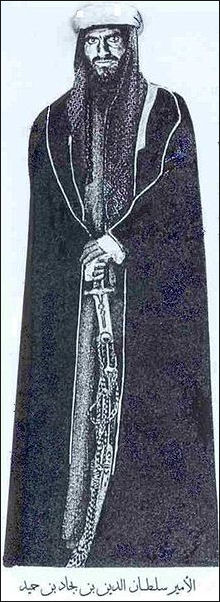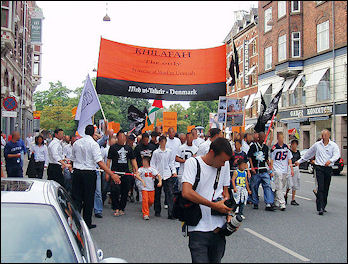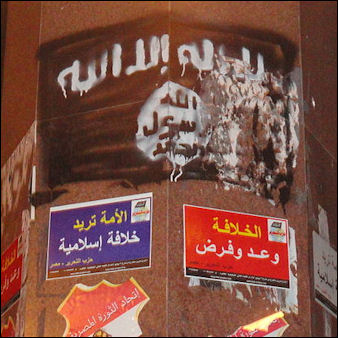Home | Category: Conservative Muslim Groups
ISLAMIST POLITICAL PARTIES
Jamaat e Islami Pakistan flag In Muslim countries that hold regular, relatively free-and-fair elections militant Islamist parties have not done very well. In Pakistan and Indonesia they rarely get more than 7 or 8 percent of the vote. There are exceptions. Hamas and Hezbollah have done well in the Palestinian territories and Lebanon, respectively. The Islamist light party in Turkey is strong. Islamist parties would probably do well where in countries like Saudi Arabia where elections have been suppressed. The Muslim Brotherhood had always done well in local elections in Egypt under Nasser, Sadat and Mubarak when it was allowed to run. In June 2012, when it was allowed to run in national elections for the first time, it won. Brotherhood members also held seats in elected parliaments in Kuwait and Jordan.
There are few secular, moderate or liberal parties in the Middle East. The dominant parties tend to be either associated with the ruling regime or are Islamist. Why is this so? Because authoritarian rulers never let moderate parties develop. Thomas Friedman wrote in the New York Times: Arab leaders “ prefer that the only choice their people have is between the state parties and religious extremists, so as to always make the authoritarian state look indispensable.”
The appeal of Islamic parties often lies in the fact that he are well organized and untainted the corruption that is entrenched in the ruling government. The food crisis in the late 2000s and early 2010s caused by high prices for wheat, rice and other staples presented opportunities for Islamic parties. While ruling regimes had difficulty subsidizing basic foods and avoiding food riots groups like the Muslim Brotherhood were giving out free bread.
Websites on Muslims Divisions Divisions in Islam archive.org ; Shi’a History and Identity shiism.wcfia.harvard.edu ; What is Shi'a Islam? iis.ac.uk ; Four Sunni Schools of Thought masud.co.uk ; History of Islam: An encyclopedia of Islamic history historyofislam.com ; Oxford Encyclopedia of the Islamic World oxfordislamicstudies.com ; Sacred Footsetps sacredfootsteps.com ; Internet Islamic History Sourcebook fordham.edu/halsall/islam/islamsbook ; Islam IslamOnline islamonline.net ; Institute for Social Policy and Understanding ispu.org; Islam.com islam.com ; BBC article bbc.co.uk/religion/religions/islam ; Islam at Project Gutenberg gutenberg.org
RECOMMENDED BOOKS:
“Islamism and Islam” by Bassam Tibi Amazon.com ;
“Conservative Islam: A Cultural Anthropology” by Erich Kolig Amazon.com ;
“Ibn Taymiyya (Makers of the Muslim World) by Jon Hoover Amazon.com ;
“Wahhabism: The History of a Militant Islamic Movement” by Cole M. Bunze Amazon.com ;
“Salafism and Traditionalism: Scholarly Authority in Modern Islam”
by Emad Hamdeh Amazon.com ;
“The Making of Salafism: Islamic Reform in the Twentieth Century” by Henri Lauzière Amazon.com ;
“Sayyid Qutb and the Origins of Radical Islamism” by John Calvert Amazon.com ;
“Milestones” by Sayed Qutb Amazon.com ;
“The Muslim Brotherhood: Evolution of an Islamist Movement” by Carrie Rosefsky Wickham Amazon.com ;
“Inside the Muslim Brotherhood: Religion, Identity, and Politics” by Khalil al-Anani Amazon.com ;
“Hizb ut-Tahrir: The Untold History of the Liberation Party”
by Reza Pankhurst Amazon.com
Roots of Islamic Conservatism
The roots of some these parties and groups go back to 19th century: According to the “New Catholic Encyclopedia”: “After Napoleon's invasion of Egypt in the late 18th century and the subjection of various portions of the Islamic world to non-Muslim colonial powers, the issues were sharpened. The differences separating Muslims were stressed, in an attempt to unite them under a caliphate in defense of Islam. Such a pan-Islamism was advocated by Jamal-al-Din al-Afghani (1839–97), who traveled widely throughout the eastern Islamic countries propagating his theories and influencing other movements. He inspired revolutions in Egypt and Iran and laid the basis for more recent popular movements combining Islamic fundamentalism with a political program. The uncompromising attitude of the Muslim Brotherhood, for example, retained many of al-Afghani's ideas. [Source: J. Kritzeck, C. Wilde, “New Catholic Encyclopedia”, 1990, Encyclopedia.com]
Israel's expansion beyond its 1948 borders resulted in an Islamic "revival," with many Muslim Palestinians returning to traditional religious practices. Various "radical" groups in the Middle East and elsewhere that have advocated violence as a legitimate means of overthrowing illegitimate political leaders, or subverting an undesirable social order, have a strong religious rhetoric. Especially since the fall of the Berlin Wall, certain elements in the Islamic world have increasingly seen the West, especially the United States, as a threat to Islamic society and traditional values.
John L. Esposito wrote in the “Worldmark Encyclopedia of Religious Practices”: The Muslim Brotherhood (Ikhwan al-Muslimin) of Egypt and the Jamaat-i Islami (Islamic Society) of the Indian subcontinent are prominent examples of modern neorevivalist Islamic organizations that linked religion to activism. Their leaders, the Muslim Brotherhood's Hasan al-Banna and Jamaat's Mawlana Abul Ala Mawdudi, were pious Muslims whose upbringing and education exposed them to modernist Islamic thought and Western learning. In contrast to Islamic modernists, who justified adopting Western ideas and institutions because they were compatible with Islam, al-Banna and Mawdudi sought to produce a new interpretation, or synthesis. Rather than leaving their societies, they organized their followers into an Islamically oriented community with a dynamic nucleus of leaders capable of transforming society from within. Joining thought to action, these leaders provided Islamic responses, both ideological and organizational, and inspired political as well as social activism. [Source: John L. Esposito “Worldmark Encyclopedia of Religious Practices”, 2000s, Encyclopedia.com]
Though anti-Western, the Muslim Brotherhood and Jamaat were not against modernization. They engaged in building modern organizations and institutions, provided modern educational and social welfare services, and used modern technology and mass communications to spread their message and to mobilize popular support. They addressed the problems of modernity, analyzing the relationship of Islam to nationalism, democracy, capitalism, Marxism, work, modern banking, education, law, women, Zionism, and international relations. The organizations established by al-Banna and Mawdudi remain vibrant today and have served as an example to others throughout much of the Muslim world.
Ibn Taymiyya
Some trace modern conservative Islam back to Ibn Taymiyya. According to the “Worldmark Encyclopedia of Religious Practices”: Ibn Taymiyya (1268–1328) lived during one of the most disruptive periods of Islamic history, which saw the fall of Baghdad and the conquest of the Abbasid empire in 1258 by the Mongols. He was forced to flee with his family to Damascus, an experience that affected his attitude toward the Mongols throughout his life and made an otherwise conservative religious scholar a militant political activist. As with many who followed him, his writing and preaching earned him persecution and imprisonment. He combined ideas and action to express belief in the interconnectedness of religion, state, and society, thus exerting an influence on modern revivalist movements.
A professor of Hanbali law (Hanbali is the most conservative of the four Sunni schools), Ibn Taymiyya relied on a rigorous, literal interpretation of the sacred sources (the Koran and the examples of the Prophet and of the early Muslim community) for Islamic renewal and the reform of society. Like many who came after him, he regarded the community at Medina as the model for an Islamic state. Ibn Taymiyya distinguished sharply between Islam and non-Islam (dar al-Islam and dar al-harb, respectively), the lands of belief and unbelief. In contrast to his vision of a close relationship between religion and the state, he made a sharp distinction between religion and culture. Although a pious Sufi, a practitioner of Islamic mysticism, he denounced as superstition such popular practices of his day as the worship of saints and the veneration of shrines and tombs.
Ibn Taymiyya's revolutionary ire was especially directed at the Mongols, who were locked in a jihad with the Muslim Mamluk rulers of Egypt. Despite their conversion to Islam, the Mongols continued to follow the code of laws of Genghis Khan instead of the Islamic law, the Shariah, and Ibn Taymiyya regarded them as no better than the polytheists of pre-Islamic Arabia. He issued a fatwa (legal opinion or judgment) that denounced them as unbelievers (kafirs) who were thus excommunicated (takfir). His fatwa established a precedent that has been used by contemporary religious extremists. Despite their claim to be Muslims, the Mongol's failure to implement Shariah rendered them, and by extension all Muslims who acted accordingly, apostates and hence the lawful object of jihad. Thus, "true" Muslims had the right, indeed duty, to revolt or wage jihad against such governments or individuals. Later generations—from the Wahhabi movement in Arabia to Sayyid Qutb in modern Egypt, from Islamic Jihad, the group that assassinated Egypt's President Anwar as-Sadat, to Osama bin Laden—would use the logic of Ibn Taymiyya's fatwa against the Mongols to call for a jihad against their "un-Islamic" Muslim rulers and elites and against the West.
Wahhabism
Wahhabism — a strict, back-to-basics form of Sunni Islam which emphasizes religious purity, strict adherence to Islamic law and a literal interpretations of Islamic texts — was founded in the18th century by Muhammad ibn Abd al-Wahhab, a theologian from the Najd area of Arabia. It is the predominate form of Islam found in Saudi Arabia and has been spread around the world with the help of Saudi wealth.
Wahhabi fundamentalists insist that they do not interpret Islamic texts but simply follow their exact, unambiguous meanings. They reject centuries of legal scholarship as unnecessary “innovation” and regard many Western values as un-Islamic. Christians and non-Wahhabi Muslims are regarded as “unbelievers” who should be avoided. Many of their beliefs aren’t that much different from those of the Taliban.
Other Islamic revivalist movements included the Mahdi of the Sudan, and Uthman dan Fodio of Nigeria.
See Separate Article: WAHHABISM: HISTORY, BELIEFS AND SAUDI ARABIA africame.factsanddetails.com
Muslim Brotherhood

Muslim Brotherhood Emblem The Muslim Brotherhood is a powerful Islamic organization, especially in Egypt. It has been around for some time and has been a prototype and an inspiration for many modern Muslim extremist groups and fundamentalist organizations.
The Muslim Brotherhood began as an effort to improve social and individual morality and fight the British occupation. It advocated both political and spiritual reform and insisted that this be achieved by organizing life and society around the Koran. These beliefs were combined with a drive to fight oppressors, get rid of poverty and social injustice and bring Muslims back to their roots. It didn’t oppose modernism and the education or employment of women as long it didn’t conflict with Islamic doctrine and was in accordance with Islamic law. The West however was regarded as a corrupting influence.
The Muslim Brotherhood has a lot money, much of it in offshore accounts. It has its own intelligence service. The Muslim Brotherhood and other moderate Islamic groups has widespread support among doctors, lawyers, religious leaders, students and ordinary men and women. It is strongly supported financially by baazaris.
John Mintz and Douglas Farah wrote in the Washington Post : The Brotherhood -- or al-Ikhwan al-Muslimun, as it is known in Arabic -- is a sprawling and secretive society with followers in more than 70 countries. It is dedicated to creating an Islamic civilization that harks back to the caliphates of the 7th and 8th centuries, one that would segregate women from public life and scorn nonbelievers. In some nations -- Egypt, Algeria, Syria, Sudan -- the Brotherhood has fomented Islamic revolution. In the Palestinian territories, the Brotherhood created the Islamic Resistance Movement, or Hamas, which has become known for its suicide bombings of Israelis. Yet it is also a sophisticated and diverse organization that appeals to many Muslims worldwide and sometimes advocates peaceful persuasion, not violent revolt. Some of its supporters went on to help found al Qaeda, while others launched one of the largest college student groups in the United States. For decades, the Brotherhood enjoyed the support of the government of Saudi Arabia and its oil billions, which helped the group expand in the United States. [Source: Washington Post , John Mintz and Douglas Farah, September 11, 2004]
See Separate Article: MUSLIM BROTHERHOOD: HISTORY, SAYYID QUTB, POLITICS africame.factsanddetails.com
Salafism
Salafism is a belief closely tied with Wahhabism. Its followers attempt to imitate the Prophet Muhammad and his 7th century companions by practicing their faith as closely as the can to a medieval ideal and even dressing like 7th century Muslims. Wahhabism is regarded as an ultra-conservative brand of Salafism. Both beliefs stress a return to “pure” and “authentic” Islam.
On his experience with the group, Mansour al-Nogaidan, a Bahraini-based journalist, wrote in the Washington Post, “I joined a hard-line Salafi group. I abandoned modern life and lived in a mud hut, apart from my family. Viewing modern education as corrupt and immoral, I joined a circle of scholars who taught the Islamic sciences in the classical way, just as they had been taught 1,200 years ago. My involvement with his group led me to violence, and landed me in prison. In 1991, I took part in firebombing video stores in Riyadh and a woman’s center in my home town of Buraidah, seeing them as symbols of sin in a society that was marching rapidly towards modernization.”
Ihsan Bagby, a professor of Islamic Studies at the University of Kentucky, told the Washington Post , “Salafis are the fundamentalist of the Muslim world. Just as Christian fundamentalists are focused on who’s going is heaven and hell, who’s the true believer and who’s the nonbeliever,” Salafis “are really focused on belief...For the most part they are apolitical.”
Salafis versus Muslim Brotherhood

Sultan Al-Otaibi Jacob Olidort of the Brookings Institute wrote: “Salafis and the Brotherhood’s more traditional Islamists are two distinct groups with distinct aims. The former seek to isolate what they perceive to be a “pure” version of the faith purportedly practiced by the earliest Muslims. The latter seek to integrate Islam into the state and other institutions of influence, and may be likened to a political lobby group. Rather than trying to influence government as Islamists tend to do, Salafis instead seek to influence other Muslims whom they dismiss as “deviant” for having sullied the “pure” faith by mixing it with other institutions and ideas that appeared after the period of the “pious predecessors” (7th-9th centuries) and which they thus consider un-Islamic.” [Source: Jacob Olidort, Brookings Institute, October 13, 2015 ]
“Whereas traditional Islamists such as the Muslim Brotherhood have clear records as hierarchical political organizations that oversaw a range of social services, Salafis have typically moved in more amorphous study circles preoccupied with lectures and publishing (owing to their aforementioned interest in “purifying” the understanding of the faith). Thus, unlike traditional Islamists, Salafi formation of political parties has been the exception rather than the rule. Since the main theaters of Salafi activity have for decades been these scholarly settings, it is there, rather than exclusively at the ballot boxes, that Salafis contend for influence among followers. In short, unlike traditional Islamists who, by design and in desire, seek direct political power, Salafis have many more channels of activity and influence outside of the parliamentary sphere.”
“Among Salafis, one would typically see themes that include promoting “justice” (‘adala), combatting “tyranny” (?ulm), “community” (umma), “rule of law” (which, strategically, Salafis refer to with the ambiguous shari‘a). These are terms that can also be found in the traditional Islamic lexicon (and so do not betray the Salafi commitment to doctrinal purism) but at the same time can very well reflect the interests of the masses. Contrast these with the Brotherhood promotion of “democracy,” “freedom” and constitutions – all terms that do not exist in traditional Islamic teaching, and whose depiction as Islamic appears to hardliners as mere political sloganeering.”
Peter Mandaville of George Mason University told the Washington Post, “Salafi teachings begin to be more attractive to more Muslims as a defensive response. In the face of this new global war on Islam, they are saying, we will hold fast and emphasize anew the fundamental tenets of our faith.”
Salafism and Politics
Jacob Olidort of the Brookings Institute wrote: “Although the core theological tenets of Salafism are well known, as is the reputation of the Salafis’ commitment to them, non-violent Salafis are as yet an unknown commodity in the political arena. The fact that they are entering as a theological rather than a political movement means that, with the exception of jihadi groups, their political platforms lack consistency. This has to do with the fact that for much of the 20th century, Salafi rhetoric has been legal and theological rather than political in nature, focusing on the “purification” of the sources of Islamic law rather than on its application by local governments. [Source: Jacob Olidort, Brookings Institute, October 13, 2015 ]
“Thus, to understand the appeal of Salafi rhetoric, political resonance may be the wrong place to look. Indeed, both jihadis and non-violent Salafis address audiences who see their world through the lens of prophetic guidance rather than political institutions. When looking beyond direct threats to Western targets and interests, the rhetorical space in which Salafis of all kinds are winning supporters is principally defined by an ability to make the prophetic prism relevant to all aspects of reality (a task typically accomplished by those most well-versed in the texts) rather than the more tactical skills of either planning political platforms or terrorist attacks. This emphasis on prophetic guidance rather than political change gives Salafis an advantage over the Muslim Brotherhood, given the mercurial political conditions and the greater rhetorical flexibility and religious grounding that Salafis have for their views.
“Salafis in both the parliamentary arena and outside it who opine on political matters use all forms of communication, especially social media platforms, as spaces for indoctrination rather than for promoting any specific political platform. Moreover, with the stigma attached to Salafis because of their ideological links to groups like al-Qaida and the Islamic State, the principal aim of indoctrination is to undo this negative image and to project the image of Salafis as part of local society. Thus, while relatively few Salafis are in the political sphere (and so most Salafis tend not to discuss political platforms), all Salafis are currently competing to project the most winning ideological posture. The net result is a new kind of hybrid politico-educational messaging pattern in which traditionally Islamic themes are presented as reflective of both Salafi doctrines and the interests of the broader voting base. In the long term, therefore, where political messages could lose relevance in new settings, the Salafi emphasis on doctrines could sustain their attraction among more ideologically-committed followers.”
Quranists
Banners of Hizb ut-Tahrir Zachery Brasier wrote in List Verse: “While other forms of Islam might seem incredibly traditional, none are as traditional as the school of thought of the Quranists. This sect of Islam comprises a variety of schools unified by the belief that only the Quran is the word of Allah. Quranists reject any Muslim literature that does not come directly from the Quran, even going so far as to say that other books or writings are forgeries. [Source: Zachery Brasier, List Verse, April 8, 2016 ]
“One of the main things the Quranists reject is the hadith. In Islamic theology, the hadith is the body of religious works that chronicle what Muhammad did and said during his life. Since the Quran does not have any biographical elements of Muhammad’s life, the hadith became important in Islam to set up practical aspects of living as a Muslim. In the Quranist schools of thought, the hadith is unnecessary. Only the Quran is necessary to tell a Muslim how to live, and anything else is a distraction.
“Quranists have existed since the early days of Islam and still persist today. They reject many practices of Islamic governments and organizations. They are strictly anti-terrorist and believe that any country that has built itself on the hadith principles is in the wrong. However, this makes Quranists very unpopular in Muslim countries. Quranists suffer persecution at the hands of many Muslim governments, often involving torture and imprisonment. Despite the opposition, their rejection of the hadith is gaining traction among modernist Muslims who want to throw out any hadith that contradicts the Quran. Both modernist Muslims and Quranists believe that the problems in the Islamic world come partly from the traditional elements of the hadith and seek to reject those teachings.”
Mawdudi and Jamat-i Islami
According to the “Encyclopaedia Judaica”: Driven by the acute sense that modernity failed to deliver on its promise and stands in sharp contrast with the traditional Islamic ideal, radical Muslim thinkers, such as Abu al-Aʿla Mawdudi (1903–1979) in India, initiated scathing attacks on the modernist approach. A central component of these attacks has been a categorical rejection of modern Western civilization which is seen as corrupt, licentious, irreligious and dangerous for Islam. The leitmotif of Mawdudi's thought is that all sovereignty in the world belongs to God alone; no other source of authority, such as the will of the people, or laws promulgated by elected legislative assemblies is legitimate. In 1941, Mawdudi juxtaposed obedience to divine law — which is Islam — with obedience to man-made laws and customs; the latter he called Jahiliyya, a term traditionally used for the pre-Islamic, pagan period in Arab history. [Source: Haïm Z’ew Hirschberg, “Encyclopaedia Judaica”, 2000, Encyclopedia.com]
John L. Esposito wrote in the “Worldmark Encyclopedia of Religious Practices”: Mawlana Abul Ala Mawdudi was born in Aurangabad in central India. His father supervised his early education in religious disciplines. It was only later that Mawdudi learned English and studied modern subjects. He turned to a career in journalism and quickly became editor of the newspaper of India's Association of Ulama. Mawdudi also became active in the Khilafat movement, which called for a restoration of the caliphate, and the All-India National Congress. He soon became convinced, however, that the identity, unity, and future of Indian Muslims were threatened not only by European imperialism but also by Hindu and Muslim nationalism. Mawdudi believed that a gradual social, rather than a violent political, Islamization of society from below was needed to create an Islamic state and society. He became editor of the journal Exegesis of the Qur’an, in which he published articles on his Islamic alternative. In 1938 he moved to Lahore (today in Pakistan) at the invitation of Muhammad Iqbal and, in 1941, organized the Jamaat-i-Islami (Islamic Society). [Source: John L. Esposito “Worldmark Encyclopedia of Religious Practices”, 2000s, Encyclopedia.com]
Mawdudi believed that Muslim societies were dominated by, and dependent on, the West, both politically and culturally. He advocated an "Islamic alternative" to conservative religious leaders and modern Western secular-oriented elites. The ulama were generally regarded as passé, a religious class whose fossilized Islam and co-option by governments were major causes for the backwardness of the Islamic community. Modernists were seen as having traded away the very soul of Muslim society out of their blind admiration for the West.
When Pakistan was established in 1947, Mawdudi — and the "Islamic Group," Jamat-i Islami organization which he founded —became immersed in a struggle to enhance as much as possible the Islamic characteristics of the newly established state. While he saw himself as the vanguard of opposition to things modern and desirous of implementing the classical ideal of Islam, in many details modern ideas and modern conditions influenced his understanding of the ideal.
Mawdudi highlighted the dichotomy between Islam and the Jahiliyya which is not only a specific historical period but also a state of affairs and a mentality which allows people to choose a way of life different from the one prescribed by God and by the Prophet Muhammad. Jahili society is not only that which denies the existence of God, but also that which does not deny it, but relegates God to the kingdom of heaven and does not apply His law on earth. Such societies, including those which are nominally Muslim, have to be replaced by societies living under the divine Muslim law. The radical Muslim trends which we exemplified by reference to Abu al-Aʿla Mawdudi gained much currency since the middle of the 20th century.
Hizb-ut-Tahrir
Hizb-ut-Tahrir, or the Party of Liberations, is the most widespread radical Islamic group in Central Asia and also has a strong base in Europe and elsewhere. Believed to have hundreds of thousands of followers, it wants to create utopian Muslim society called a caliphate that it hopes will take root in Central Asia and then spread throughout the Middle East and North Africa too.
Hizb-ut-Tahrir is active in over 40 countries and was nearly banned in Britain after the London subway bombing. Founded in the Middle East in 1952 as a Leninist, anti-royalist revolutionary party and as an offshoot of the Muslim Brotherhood, it made inroads into Central Asia after the after the collapse of the Soviet Union perhaps because it was Islamic with socialist leanings.

Flag of Hizb_ut-Tahrir The group’s founder Abdul Qadeen Zallon died in the 2003 and was replaced by the Palestinian Ata Abu-i-Rushta. One of its leaders in Uzbekistan is a smooth-taking, Arabic-speaking religious leader named Abdurashid, who began his faction as a study group in the 1980s. Another leader, Yusuf Kasimakhunov, was detained in Russia in 2004.
Hizb-ut-Tahrir is outlawed in Uzbekistan and has been accused by the Uzbekistan government of inspiring terrorist attacks in Uzbekistan that have left dozens dead. More than 4,000 members of the group have been imprisoned there. The Uzbekistan government has accused the group of operating terrorist cells in Tashkent and Bukhara and said it has members who trained at Al-Qaida camps. Hizb-ut-Tahrir is banned in Kyrgyzstan and Tajikistan but operated fairly open in the Osh area of Kyrgyzstan. Authorities in Kazakhstan and Kyrgyzstan have tried to suppress it.
Hizb-ut-Tahrir, Restoring the Caliphate and Other Beliefs
Among Hizb ut-Tahrir’s goals are founding utopian communities, establishing strict Islamic law that requires segregation between men and women, and requiring a return to the gold standard. The group calls for jihad against Israel and non-believers even though it insists it is non-violent. Hizb ut-Tahrir is the group most directly focused on the push for a new caliphate.
Many Western analysts accept Hizb-ut-Tahrir’s claim that it is non-violent. The group claims it can establish a Islamic state in three stages: 1) educates Muslims about its ideology; 2) spread these views into the government; and 3) topple secular regimes from the inside. In Uzbekistan the group is believed to have achieved the first stage and won many followers by focusing on poverty and corruption.
Carl Vick, wrote in Washington Post: “The group has a rigid, cellular, secretive structure and a bookish set of beliefs describing its utopian vision for a future caliphate. Hizb ut-Tahrir insists it has renounced violence...When young Muslims raised largely without religious instruction in European cities begin asking questions, radical groups stand ready with answers. Hizb ut-Tahrir, which promotes conspiracy theories and a potent anti-Semitism, is toward the moderate end of a spectrum of groups promoting unnuanced interpretations of Islam calling for confrontation. [Source: Carl Vick, Washington Post, January 14, 2006]
"An ideology must perpetuate itself," said Ahmet Arslankaya, an Hizb ut-Tahrir member in Turkey, where the organization faces harassment by security services. "Our final strategic aim will be to expand the Islamic thought to the world and carry the Islamic banner to the White House, of course."
The system Hizb ut-Tahrir wants to create “includes a caliphate, revived after national governments are subverted by Hizb ut-Tahrir members working in their highest levels, according to the plan. Hizb ut-Tahrir members have been charged with planning such coups in Jordan and Egypt. Zeyno Baran, an analyst at the Washington-based Nixon Center who has written extensively on the group, said it could "usefully be thought of as a conveyor belt for terrorists."
Hizb-ut-Tahrir in Europe

Hizb ut-Tahrir
demonstration in Copenhagen Hizb-ut-Tahrir is active throughout the Muslim world and many non-Muslim countries. It is banned in many Muslim countries but is legal and allowed to operate openly in many European countries, including Britain. The group is not shy about openly promoting its agenda. On one of its official websites it declared: “The winner of the ideological struggle “will decide whether the future belongs to Islam or Western secular liberalism.”
Describing a rare public meeting of Hizb ut-Tahrir in Copenhagen, Carl Vick wrote in the Washington Post, “On a cloudy Sunday...about 800 young Danes, mostly the children of Muslim immigrants, were crowding into a civic sports hall. The first presentation: graphic images of dead Iraqi children."For a long time nobody heard of HT. They were underground," Kian Schmucker, a Copenhagen city council candidate, told the Washington Post as he passed out leaflets outside the hall. [Source: Carl Vick, Washington Post, January 14, 2006]
"No one can doubt that the declared war on terrorism is a war on Islam," Fadi Abdullatif, a local Hizb ut-Tahrir spokesman, declared from the podium as the videotape ended. "This Islamic state is the only protection, the only shield for the Muslims." The chorus of " Allahu akbar! " — God is great — was led by ardent young Europeans, a handful of converts in an attentive audience segregated by gender: fashionably dressed young men on the right, women in head scarves on the left.
“For four hours they heard Hizb ut-Tahrir's disciplined, intensely argued belief that the Muslim world lost its moorings when it imported not only scientific advances from the West, but also systems such as nationalism and democracy that emerged at the same time. In a series of 22 volumes on sale beside the podium, and in weekly discussions, the group sketches an alternative governing system it believes lies embedded in the Koran and the teachings of the prophet.
As the Hizb ut-Tahrir meeting in Copenhagen broke for evening prayers, Muziz Abdullah, an affable native of Lebanon, surveyed a hall still with standing-room only. "Ten years ago, when I started, it was totally unrealistic to think there could be a caliphate," he said. "But now, people believe it could happen in a few years."
Image Sources: Wikimedia Commons, except Qutb books, Amazon
Text Sources: Internet Islamic History Sourcebook: sourcebooks.fordham.edu ; Arab News, Jeddah; “Islam, a Short History” by Karen Armstrong; “A History of the Arab Peoples” by Albert Hourani (Faber and Faber, 1991); “World Religions” edited by Geoffrey Parrinder (Facts on File Publications, New York); “Encyclopedia of the World’s Religions” edited by R.C. Zaehner (Barnes & Noble Books, 1959); Metropolitan Museum of Art, Encyclopedia.com, National Geographic, BBC, New York Times, Washington Post, Los Angeles Times, Smithsonian magazine, The Guardian, Al Jazeera, The New Yorker, Time, Newsweek, Reuters, Associated Press, AFP, Library of Congress and various books and other publications.
Last updated April 2024



